Complete Works of Homer Read online
Page 3
So old as I. I lived long since, and was companion
With men superior to you both, who yet would ever- hear
My counsels with respect. Mine eyes yet never witness were,
Nor ever will be, of such men as then delighted them :
Pirithous, Exadius, and god-like Polypheme,
Cseneus, and Dryas prince of men, iEgean Theseus,
A man like heaven's immortals formed; all, all most vigorous,
Of all men that even those days bred; most vigorous men, and fought
With beasts most vigorous, mountain beasts (for men in strength were nought
Matched with their forces) fought with them, and bravely fought them down.
Yet even with these men I conversed, being called to the renown
Of their societies, by their suits from Pylos far, to fight
In the Asian kingdom; and I fought, to a degree of might
That helped even their mights, against such as no man now would dare
To meet in conflict; yet even these my counsels still would hear,
And with obedience crown my words. Give you such palm to them;
'Tis better than to wreak your wraths. Atrides, give not stream
To all thy power, nor force his prize, but yield her still his own,
As all men else do. Nor do thou encounter with thy crown,
Great son of Peleus, since no king that ever Jove allowed
Grace of a sceptre equals him. Suppose thy nerves endowed
With strength superior, and thy birth a very goddess gave,
Yet he of force is mightier, since what his own nerves have
Is amplified with just command of many other. King of men,
Command thou then thyself; and I with my prayers will obtain
Grace of Achilles to subdue his fury; whose parts are
Worth our entreaty, being chief check to all our ill in war."
“All this, good father," said the king, " is comely and good right;
But this man .breaks all such bonds; he affects, past all men, height:
All would in his power hold, all make his subjects, give to all
His hot will for a temperate law; all which he never shall
Persuade at my hands. If the gods have given him the great style
Of ablest soldier, made they that his licence to revile
Men with vile language?" Thetis' son prevented him, and said :
“Fearful and vile I might be thought, if the exactions laid
By all means on me I should bear. Others command to this,
Thou shalt not me; or if thou dost, far my free spirit is
From serving thy command. Besides, this I affirm (afford
Impression of it in thy soul) I will not use my sword
On thee or any for a wench, unjustly though thou takest
The thing thou gavest; but all things else that in my ship thou makest
Greedy survey of, do not touch without my leave; or do, —
Add that act's wrong to this, that these may see that outrage too, —
And then comes my part; then be sure thy blood upon my lance
Shall flow in vengeance." These high terms these two at variance
Used to each other; left their seats; and after them arose
The whole court. To his tents and ships, with friends and soldiers, goes
Angry Achilles. Atreus' son the swift ship launched, and put
Within it twenty chosen rowers, within it likewise shut
The hecatomb to appease the God; then caused to come aboard
Fair-cheeked Chryseis; for the chief, he in whom Pallas poured
Her store of counsels, Ithacus, aboard went last; and then
The moist ways of the sea they sailed. And now the king of men
Bade all the host to sacrifice. They sacrificed and cast
The offal of all to the deeps; the angry God they grace
With perfect hecatombs; some bulls, some goats, along the shore
Of the unfruitful sea, inflamed. To heaven the thick fumes bore
Enwrapped savours. Thus, though all the politic king made show
Respects to heaven, yet he himself all that time did pursue
His own affections; the late jar, in which he thundered threats
Against Achilles, still he fed, and his affections' heats
Thus vented to Talthybius, and grave Eurybates
Heralds, and ministers of trust, to all his messages.
“Haste to Achilles' tent; where take Briseis' hand, and bring
Her beauties to us. If he fail to yield her, say your king
Will come himself, with multitudes that shall the horribler
Make both his presence, and your charge, that so he dares defer."
This said, he sent them with a charge of hard condition.
They went unwillingly, and trod the fruitless sea's shore; soon
They reached the navy and the tents, in which the quarter lay
Of all the Myrmidons, and found the chief Chief in their sway
Set at his black bark in his tent. Nor was Achilles glad
To see their presence; nor themselves in any glory had
Their message; but with reverence stood, and feared the offended king,
Asked not the dame, nor spake a word. He yet, well knowing the thing
That caused their coming, graced them thus: " Heralds, ye men that bear
The messages of men and gods, ye are welcome, come ye near.
I nothing blame you, but your king 'tis he, I know, doth send
You for Briseis; she is his. Patroclus, honoured friend,
Bring forth the damsel, and these men let lead her to their lord.
But, heralds, be you witnesses before the most adored,
Before us mortals, and before your most ungentle king,
Of what I suffer, that, if war ever hereafter bring
My aid in question, to avert any severest bane
It brings on others, I am 'scused to keep mine aid in wane,
Since they mine honour. But your king, in tempting mischief, raves,
Nor sees at once by present things the future; how like waves
Ills follow ills; injustices being never so secure
In present times, but after-plagues even then are seen as sure;
Which yeit he sees not, and so soothes his present lust, which checked
Would check plagues' future; and he might, in succouring right, protect
Such as fight for his right at fleet. They still in safety fight
That fight still justly." This speech used, Patroclus did the rite
His friend commanded, and brought forth Briseis from her tent,
Gave her the heralds, and away to the Achive ships they went.
She sad, and scarce for grief could go. Her love all friends forsook,
And wept for anger. To the shore of the old sea he betook
Himself alone, and casting forth upon the purple sea
His wet eyes, and his hands to heaven advancing, this sad plea
Made to his mother: " Mother! since you brought me forth to breathe
So short a life, Olympius had good right to bequeath
My short life honour; yet that right he doth in no degree,
But lets Atrides do me shame, and force that prize from me
That all the Greeks gave." This with tears he uttered, and she heard,
Set with her old sire in his deeps, and instantly appeared
Up from the grey sea like a cloud, sate by his side, and said :
“Why weeps my son? What grieves thee? Speak, conceal not what hath laid
Such hard hand on thee, let both know." He, sighing like a storm,
Replied : " Thou dost know. Why should I things known again inform?
We marched to Thebes, the sacred town of King Eetion,
Sacked it, and brought to fleet the spoil, which every valiant son
Of Greece indifferently shared. Atrides had for sh
are
Fair-cheeked Chryseis. After which, his priest, that shoots so far,
Chryses, the fair Chryseis' sire, arrived at th' Achive fleet,
With infinite ransom, to redeem the dear imprisoned feet
Of his fair daughter. In his hands he held Apollo's crown,
And golden sceptre; making suit to every Grecian son,
But most the sons of Atreus, the others' orderers,
Yet they least heard him; all the rest received with reverend ears
The motion, both the priest and gifts gracing, and holding worth
His wished acceptance. Atreus' son yet (vexed) commanded forth
With rude terms Phoebus' reverend priest; who, angry, made retreat,
And prayed to Phoebus, in whose grace he standing passing great
Got his petition. The God an ill shaft sent abroad
That tumbled down the Greeks in heaps. The host hpd no abode
That was not visited. We asked a prophet that well knew
The cause of all; and from his lips Apollo's prophecies flew,
Telling his anger. First myself exhorted to appease
The angered God, which Atreus' son did at the heart displease;
And up he stood, used threats, performed. The black-eyed Greeks sent home
Chryseis to her sire, and gave his God a hecatomb.
Then, for Briseis, to my tents Atrides' heralds came,
And took her that the Greeks gave all. If then thy powers can frame
Wreak for thy son, afford it. Scale Olympus, and implore
Jove (if by either word or fact thou ever didst restore
Joy to his grieved heart) now to help. I oft have heard thee vaunt
In court of Peleus, that alone thy hand was conversant
In rescue from a cruel spoil the black cloud-gathering Jove,
Whom other Godheads would have bound (the Power whose pace doth move
The round earth, heaven's great Queen, and Pallas); to whose bands
Thou cam'st with rescue, bringing up him with the hundred hands
To great Olympus, whom the Gods call Briareus, men
Aegseon, who his sire surpassed, and was as strong again,
And in that grace sat glad by Jove. Th' immortals stood dismayed
At his ascension, and gave free passage to his aid.
Of all this tell Jove; kneel to him, embrace his knee, and pray,
If Troy's aid he will ever deign, that now their forces may
Beat home the Greeks to fleet and sea; embruing their retreat
In slaughter; their pains paying the wreak of their proud sovereign's heat;
And that far-ruling king may know from his poor soldier's harms
His own harm falls; his own and all in mine, his best in arms."
Her answer she poured out in tears: " O me, my son," said she,
“Why brought I up thy being at all, that brought thee forth to be
Sad subject of so hard a fate? O would to heaven, that since
Thy fate is little, and not long, thou might'st without offence
And tears perform it! But to live thrall to so stern a fate
As grants thee least life, and that least so most unfortunate,
Grieves me to have given thee any life. But what thou wishest now,
If Jove will grant, I'll up and ask; Olympus crowned with snow
I'll climb; but sit thou fast at fleet, renounce all war, and feed
Thy heart with wrath, and hope of wreak; till which come, thou shalt need
A little patience. Jupiter went yesterday to feast
Amongst the blameless Jithiops, in th' ocean's deepened breast,
All Gods attending him; the twelfth, high heaven again he sees,
And then his brass-paved court I'll scale, cling to his powerful knees,
And doubt not but to win thy wish." Thus, made she her remove,
And left wrath tyring on her son for his enforced love.
Ulysses, with the hecatomb, arrived at Chrysa's shore;
And when amidst the haven's deep mouth they came to use the oar,
They straight struck sail, then rolled them up, and on the hatches threw;
The top-mast to the kelsine then with halyards down they drew;
Then brought the ship to port with oars; then forked anchor cast;
And, against the violence of storm, for drifting made her fast.
All come ashore, they all exposed the holy hecatomb
To angry Phoebus, and, with it, Chryseis welcomed home;
Whom to her sire, wise Ithacus, that did at the altar stand,
For honour, led, and, speaking thus, resigned her to his hand :
“Chryses, the mighty king of men, great Agamemnon sends
Thy loved seed by my hands to thine; and to thy God commends
A hecatomb, which my charge is to sacrifice, and seek
Our much-sigh-mixed woe his recure, invoked by every Greek."
Thus he resigned her, and her sire received her highly joyed.
About the well-built altar, then, they orderly employed
The sacred offering, washed their hands, took salt cakes; and the priest,
With hands held up to heaven, thus prayed : " O thou that all things seest,
Fautour of Chrysa, whose fair hand doth guardfully dispose
Celestial Cilia, governing in all power Tenedos,
O hear thy priest, and as thy hand, in free grace to my prayers,
Shot fervent plague-shafts through the Greeks, now hearten their affairs
With health renewed, and quite remove th' infection from their blood."
He prayed; and to his prayers again the God propitious stood.
All, after prayer, cast on salt cakes, drew back, killed, flayed the beeves,
Cut out and dubbed with fat their thighs, fair dressed with doubled leaves,
And on them all the sweetbreads pricked. The priest, with small sere wood,
Did sacrifice, poured on red wine; by whom the young men stood,
And turned, in five ranks, spits. On which (the legs enough) they eat
The inwards; then in gigots cut the other fit for meat,
And put to fire; which roasted well they drew. The labour done,
They served the feast in that fed all to satisfaction.
Desire of meat and wine thus quenched, the youths crowned cups of wine
Drunk off, and filled, again to all. That day was held divine,
And spent in pseans to the Sun, who heard with pleased ear;
When whose bright chariot stooped to sea, and twilight hid the clear,
All soundly on their cables slept, even till the night was worn.
And when the Lady of the light, the rosy-fingered Morn,
Rose from the hills, all fresh arose, and to the camp retired.
Apollo with a fore-right wind their swelling bark inspired.
The top-mast hoisted, milk-white sails on his round breast they put,
The mizens strooted with the gale, the ship her course did cut
So swiftly that the parted waves against her ribs did roar;
Which, coming to the camp, they drew aloft the sandy shore;
Where, laid on stocks, each soldier kept his quarter as before.
But Peleus' son, swift-foot Achilles, at his sjvift ships sate
Burning in wrath, nor ever came to councils (if estate
That make men honoured, never trod the fieroejmaiiattled field,
But kept close, and his loved heart pined, what fight and cries could yield
Thirsting at all parts to the host. And now, since first he told
His wrongs to Thetis, twelve fair morns their ensigns did unfold,
And then the ever-living Gods mounted Olympus, Jove
First in ascension. Thetis then remembered well to move
Achilles' motion, rose from sea, and, by the morn's first light
The great heaven and Olympus climbed; where, in supremest height
&n
bsp; Of all that many-headed hill, she saw the far-seen son
Of Saturn, set from all the rest, in his free seat alone.
Before whom, on her own knees fall'n, the knees of Jupiter
Her left hand held, her right his chin, and thus she did prefer
Her son's petition : "Father Jove! If ever I have stood
Aidful to thee in word or work, with this implored good
Requite my aid, renown my son, since in so short a race
(Past others) thou confin'st his life. An insolent disgrace
Is done him by the king of men; he forced from him a prize
Won with his sword. But thou, O Jove, that art most strong, most wise,
Honour my son for my sake; add strength to the Trojan's side
By his side's weakness in his want; and see Troy amplified
In conquest, so much and so long, till Greece may give again
The glory reft him, and the more illustrate the free reign
Of his -wronged honour." Jove at this sate silent; not a word
In long space passed him. Thetis still hung on his knee, implored
The second time his help, and said : " Grant or deny my suit,
Be free in what thou dost; I know thou canst not sit thus mute
For fear of any; speak, deny, that so I may be sure
Of all heaven's Goddesses, 'tis I that only must endure
Dishonour by thee." Jupiter, the great cloud-gatherer, grieved
With thought of what a world of griefs this suit asked, being achieved,
Swelled, sighed, and answered : " Works of death thou urgest. O at this
Juno will storm, and all my powers inflame with contumelies.
Ever she wrangles, charging me in ear of all the Gods
That I am partial still, that I add the displeasing odds
Of my aid to the Ilians. Begone then, lest she see;
Leave thy request to my care; yet, that trust may hearten thee
With thy desire's grant, and my power to give it act approve
How vain her strife is, to thy prayer my eminent head shall move;
Which is the great sign of my will with all th' immortal states;
Irrevocable; never fails; never without the rates
Of all powers else; when my head bows, all heads bow with it still
As their first mover; and gives power to any work I will."
He said; and his black eyebrows bent; above his deathless head
The ambrosian curls flowed; great heaven shook; and both were severed;
Their counsels broken. To the depths of Neptune's kingdom dived
Thetis from heaven's height; Jove arose, and all the Gods received

 The Odyssey
The Odyssey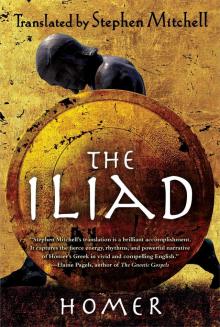 The Iliad
The Iliad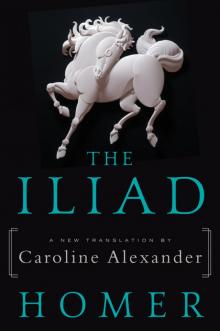 The Iliad (Trans. Caroline Alexander)
The Iliad (Trans. Caroline Alexander)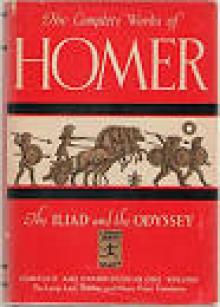 Complete Works of Homer
Complete Works of Homer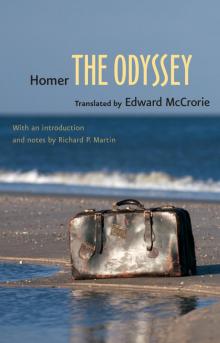 The <I>Odyssey</I>
The <I>Odyssey</I>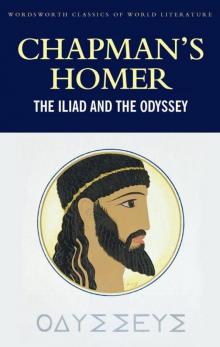 The Iliad and the Odyssey (Classics of World Literature)
The Iliad and the Odyssey (Classics of World Literature)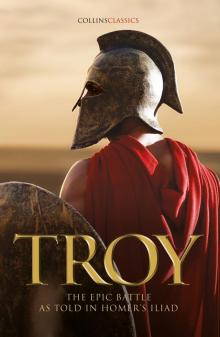 Troy
Troy The Iliad (Penguin Classics)
The Iliad (Penguin Classics)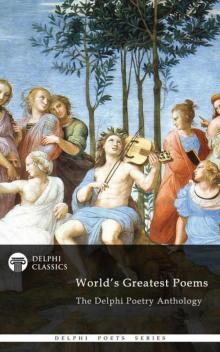 Delphi Poetry Anthology: The World's Greatest Poems (Delphi Poets Series Book 50)
Delphi Poetry Anthology: The World's Greatest Poems (Delphi Poets Series Book 50)